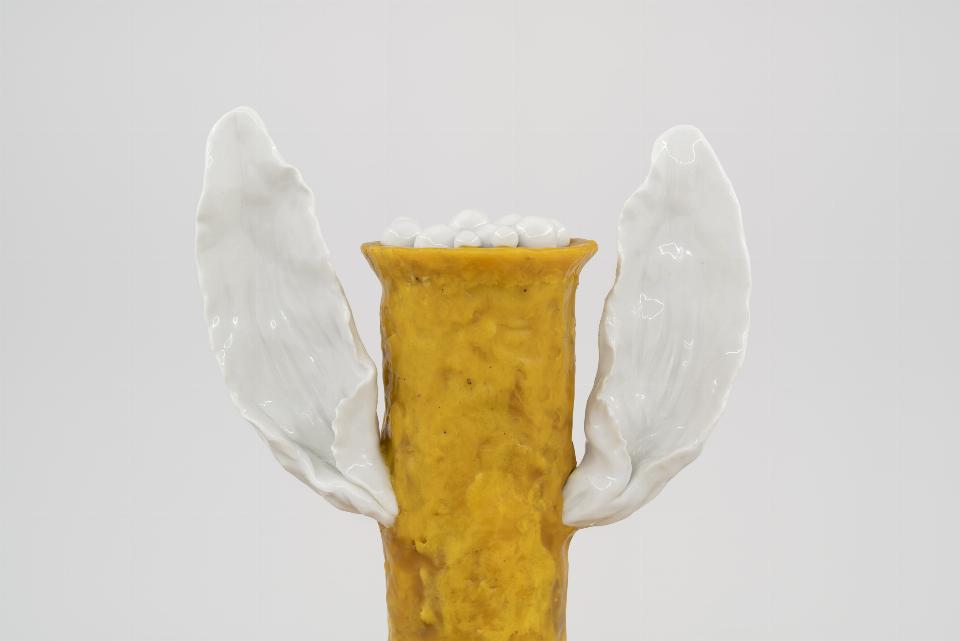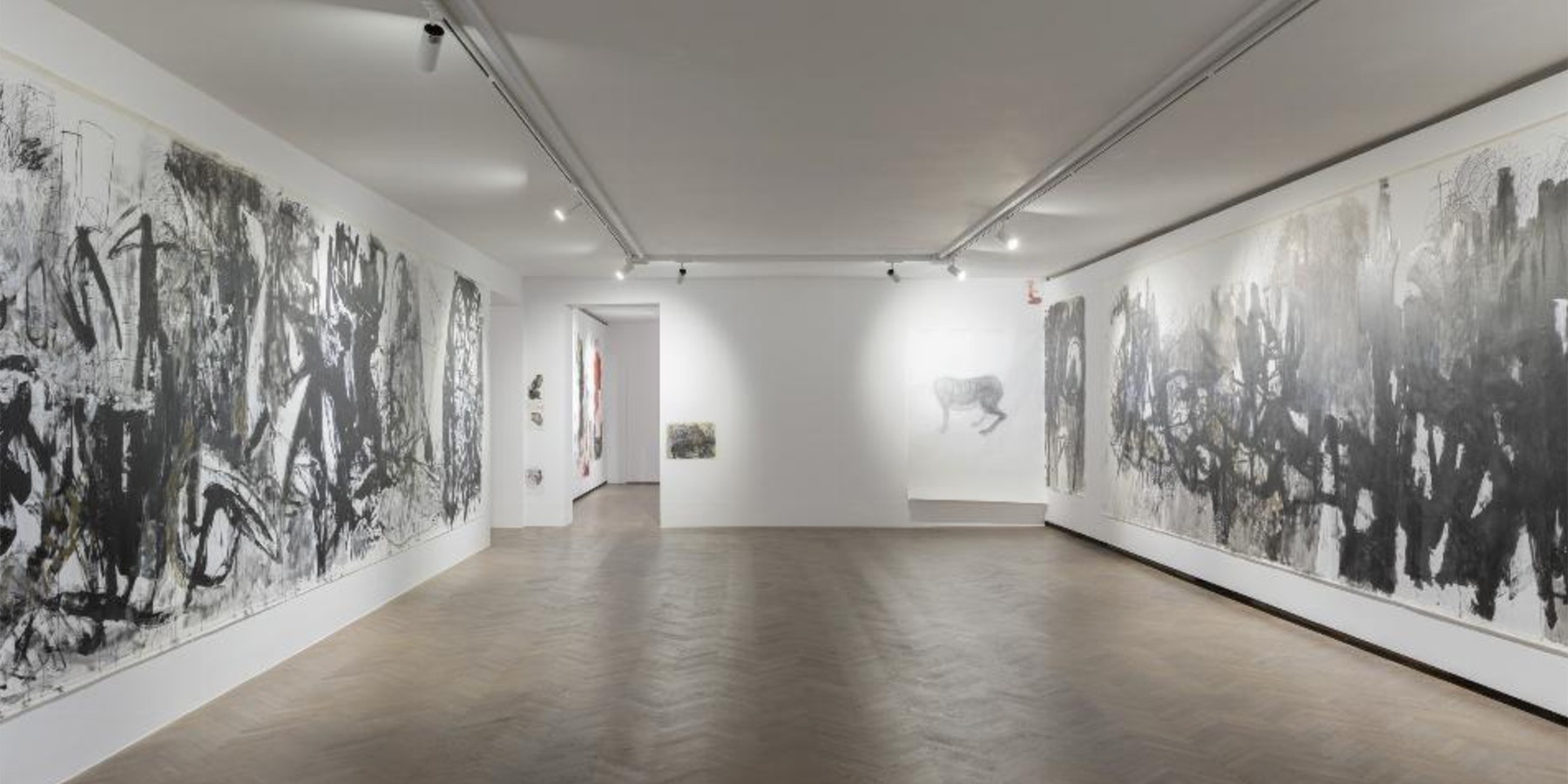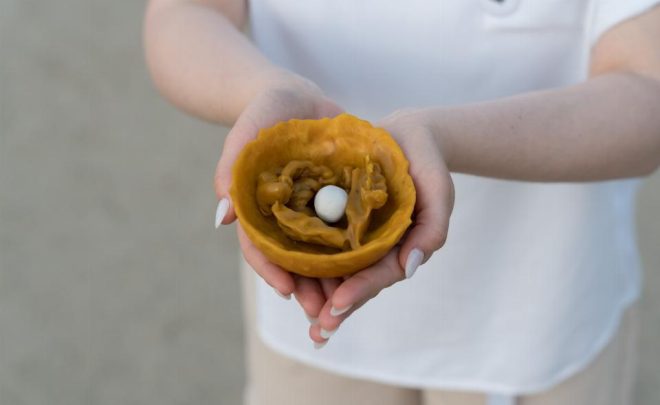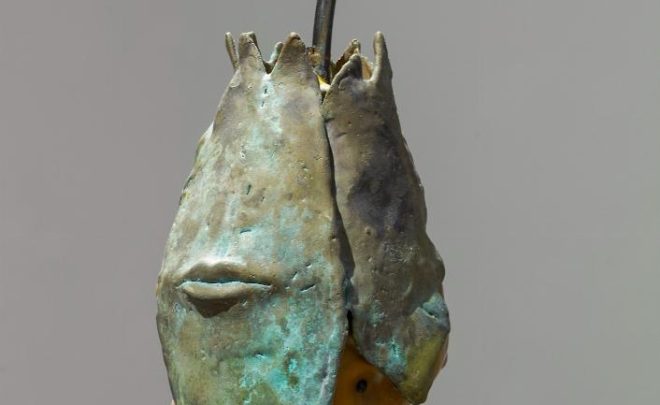Discussion | On political interventions in contemporary art institutions
On political interventions in contemporary art institutions
Discussion with the participation of Gideon Horváth, Jen Kratochvil and Marianna Dobkowska
Moderation: Katarzyna Różniak – Szabelska

29.06.2024 (Saturday), 12:00 (free entrance)
Arsenal Gallery in Białystok
At 11:00 a.m., we also invite you to Gideon Horváth’s guided tour of The Whispering Hole exhibition (in English)
One of the works presented at The Whispering Hole exhibition is The Vase of Shame. The Vase of Shame was made in 2023, when Gideon Horváth participated in an exhibition presenting the winners of Esterhazy Art Award, one of the most important prize for young Hungarian artists. At the time, his installation was shown at the Ludwig Museum in a censored version, following the Hungarian government’s enactment in 2021 of the still-effective “Propaganda Law,” a law prohibiting the depiction and promotion of diverse gender identities and sexual orientations. In the exhibition, The Vase of Shame was an encrypted message about the shame of participating in the censorship process, but also the shaming the young artist subsequently faced from parts of his community. On the one hand, it’s a story about the production of a culture of shame that takes away agency, and on the other, about the expectation of heroism from a repressed homosexual artist.
On June 29 at the Arsenal Gallery in Bialystok, together with invited guests, we will reflect on the consequences of the conservative turn and nationalist tendencies for the field of visual arts in Central and Eastern Europe. The perspective of a young queer artist working in contemporary Hungary will be presented by Gideon Horváth. The programming of the Kunsthalle in Bratislava and the loss of the institution after the new nationalist Slovak government took power will be discussed by its former director, Jen Kratochvil. Marianna Dobkowska, a curator associated with the Center for Contemporary Art Ujazdowski Castle, will share her experience as an employee of an institution that has been implementing the cultural policies of the right-wing government in recent years. During the discussion, led by exhibition curator Katarzyna Różniak-Szabelska, we will exchange experiences that the political transformations of recent years have brought to art institutions in Poland, Hungary and Slovakia. Talking with artists, employees and directors of the institutions, we will also pay attention to the perspectives of various agents of the art field, considering the possibilities of forming alliances.

Vase of Shame, 2023, beeswax, steel, porcelain, 175 × 50 × 40 cm
Jen Kratochvil (born 1986, Czech Republic) is a curator and educator based in Vienna and Prague. He graduated from the Academy of Arts, Architecture and Design in Prague and currently teaches at the Photography Department of the Film Academy in Prague (since 2019). Kratochvil served as the director of Kunsthalle Bratislava (2021-2024) until its closure by a new nationalist Slovak government. He was co-founder of Significant Other, a project space and curatorial platform located in Vienna, operating within the larger Central European region, concerned with the overlaps of architecture and urbanism with art (2017-2020). Previously, Kratochvil worked as a freelance curator in collaboration with various state-run institutions (such as Galerie Rudolfinum and the National Gallery Prague), independent spaces, and private galleries. His long-term research explores various forms of identity de/construction in Eastern Europe through artistic practices and institutional engagement and critique. His curatorial practice primarily focuses on time-based and lens-based media, with special attention to architecture, technology, and the potential of queer resistance amid a collectively experienced conservative turn within the region.
Marianna Dobkowska is an art historian and curator of the residency program at the CCA Ujazdowski Castle in Warsaw. Her practice draws from the fields of visual and performing arts, education, collective action and activism. Her selected curatorial projects include the series of international curatorial seminars Re-Directing: East (2011-2020), the exhibition at the National Gallery of Indonesia in Jakarta Social Design for Social Living (2016), the exhibition-cum-meeting Gotong Royong. Things We Do Together (2017-2018). She is co-editor of the book Things We Do Together. The Post-Reader (Mousse Publishing and Ujazdowski Castle, 2020), a member of the curatorial team of the event series Contexts. Post-Artistic Congress in Sokolowsko and at the Berlin Floating (2021-2024). Together with Sebastian Cichocki, she curated the Postartistic Assembly – Polish Pavilion within the Gwangju Biennale (2023). Dobkowska is a founding member of the Postartistic Services Office. She lives and works in Warsaw.
Gideon Horváth is a Budapest-based visual artist, born in 1990. He studied performing arts and cinema at Université Paris VIII. (2010-2013) and intermedia at the Hungarian University of Fine Arts (2014-2015). In 2023, he was awarded the Esterházy Prize, and in 2024, for “Myths of Vulnerability,” he was awarded the prize for the best solo exhibition of 2023 by the Hungarian branch of the International Association of Art Critics, AICA. He has participated in residencies at PRÁM Studio in Prague, Czech Republic (2023), Akademie Schloss Solitude in Stuttgart, Germany (2012) and Cité International des Arts in Paris, France (2020). His work has been featured in many solo exhibitions – including Memory That Could Have Been at Sidewalk (as part of the First Biennial of Contemporary Public Art in Budapest, 2023); Pulp at Pram Studio (Prague, 2023); Myths of Vulnerability at Glassyard Gallery (Budapest, 2023); Kiss of the Sun at Ena Viewing Space (Budapest, 2022); The Faun’s Ball at TIC Gallery (Brno, 2021); Faun Realness at ISBN Gallery (Budapest, 2021); – as well as group shows – among others Esterházy Art Award Short List at Ludwig Museum (Budapest, 2024), …and they lived… at Kunsthalle Bratislava (Bratislava, 2023); ; The Sea of Cheese at TRAFO (Szczecin 2023) Different Solar settings at David Kovats Gallery (London, 2022); Sensory Tales at Krinzinger Gallery (Vienna, 2022); They/Them/Their: Naturally Not Binary at IMT Gallery (London, 2022) and Hope is not Desire at Sopa Gallery (Kosice, 2022).
Katarzyna Różniak-Szabelska (born 1987) – is an art historian and curator associated with Arsenal Gallery in Bialystok since 2020. Among the group exhibitions she has curated are Right After Valentine’s (2024, together with Tomek Pawłowski-Jarmołajew), Duby smalone [Fiddlesticks] (2023), Deschool! (2022), In the beginning was the deed! (2021, with Post Brothers), Solidarity and Agency (2020, with Eliza Urwanowicz-Rojecka). She has also curated solo exhibitions such as Gideon Horváth’s The Whispering Hole (2024), Marta Romankiv’s The First Impression is the Most Important (2023), Zuzanna Hertzberg’s Mechitza (2023), So They Don’t Say We Don’t Remember by Yarema Malashchuk and Roman Khimei (2022), Instead of Sighing, We Turn to Singing by Alicja Rogalska (2022), J/P/K Jasanský Polák Karny by the duo Jasanský & Polák (2022) or Alienbees, Save Us Please! by Anna Hulačová (2021), as well as actions in urban space (including One Day by the Public Movement group, 2022) and many performative and community art actions with audience participation. She is interested in art in Central and Eastern Europe in its political and social dimensions.

PLAN YOUR VISIT
Opening times:
Thuesday – Sunday
10:00-18:00
Last admission
to exhibition is at:
17.30

